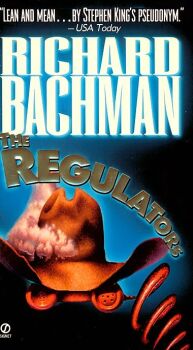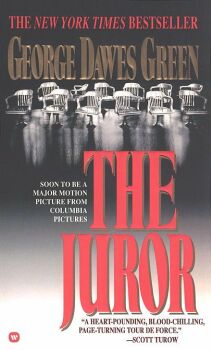REVIEWS || books

It's no longer a secret that Richard Bachman is the "alter ego" of horrormeister Stephen King, but King reportedly buried Bachman several years ago when his identity was revealed. However, a "long lost manuscript" was apparently found, and has been published as The Regulators, a story of an evil force that has trapped and tormented a neighborhood in Ohio, and threatens to do more damage unless the remaining residents of the street can band together and defeat it.
This book came out at the same time as King's own Desperation, and reading both novels in succession is particularly disconcerting. It's an interesting concept, as both books are essentially about the same evil, only in different manifestations. The Regulators finds the bad guy/thing/whatever making it out of the mine shaft in Desperation, AZ, and getting all the way back to middle America through Seth Garin, a six-year old autistic boy. The infuriating part is that both books use all the same character names, only the characters themselves are, with a few very notable exceptions, quite different. Desperation featured the Carver family, only this time, the children are the parents, and vice versa. Mary Parker, whose husband was killed early in King's novel, is knocked off in the early going here. As a result, the story was a little difficult to follow, as the reader is forced to suppress the memory of the other book as he or she reads this one.
The story also isn't quite as good. A child's playthings become tangible terrors for the people of Poplar Street, and this forces a bit too much reliance on the fictional MotoKops, a sort of Mighty Morphing Power Rangers that drive around in brightly colored vans. While its hard to say that these vans and their drivers aren't believable in the context of the whole story, they aren't terribly compelling. There are some interesting interactions in the course of the book, but nothing really holds up well, quite possibly because of the weird sense of deja vu created by the dual identities of the characters. What is interesting is that this book solidifies the roles of writer Johnny Marinville, Cynthia Schmidt, and Steve Ames as the real protagonists of both novels, although their identities have also shifted between the two.
On some level, The Regulators represents an interesting little experiment on the part of Stephen King. To tell the same story twice, in entirely different contexts, may have seemed like a neat idea, but reading the two books in rapid succession is clearly not the way to appreciate it.

Pioneering an entire genre of science fiction isn't necessarily a good thing. William Gibson burst onto the scene in 1984 with the Hugo and Nebula award-winning Neuromancer, ushering in a new breed of sci-fi known as cyberpunk. Simply put, that novel was brilliant, and left Gibson with the unenviable task of having to live up to it with his subsequent work. While his success at this has been debateable, it would be unfair to say that he hasn't written some good books in the process. His latest effort, Idoru, is a solid piece of science fiction set only a few years in the future, revolving about a rock star and his intention to, essentially, marry a hologram.
The story has two main characters set on entirely different paths. The first, Colin Laney, is a data analyst with a unique ability to detect patterns in massive volumes of information, which allows him to unearth unknown or even hidden facts about his subjects. These talents had been put to work by the future equivalent of tabloid television, digging for dirt on celebrities, until Laney was implicated in the death of a young woman involved with one of his targets. This story is told in retrospect by Laney to his new employers, a huge Australian bodyguard and a Japanese man who work for a legendary rock band called Lo/Rez. His job is to find out what is behind Rei Toei, a holographic singer that one of the leaders of the band, Rez, intends to marry.
The second thread of the story is about a young fan of Lo/Rez named Chia Pet Mackenzie, who is charged by her local chapter of the band's fan club to fly to Tokyo and figure out if the rumours of Rez's intentions to marry a software agent are true. After a strange encounter on the flight to Japan and a stonewalling by the local Japanese chapter of the fan club once she arrives, Chia is thrown into a tangled web of computer hackers and seedy underworld types. Her inquiries about Lo/Rez pique some interest, dragging the mess she's gotten herself into over to Laney and his employers.
Gibson does an admirable job of telling two almost entirely separate stories, and then weaving them together. It's subtle at first, but over time, the paths of Laney and Chia seem as destined for each other as Rez and Rei Toei. The characters are well-written, with a myriad of different appearances and motivations all converging on Tokyo and the paradox of a man marrying a hologram. His description of Laney's ability to catch 'nodal points' in huge quantities of data is fascinating, and Laney's story reflects the sort of burned-out reluctant hero that fans have come to expect from Gibson.
It's also an interesting exercise to judge Gibson's prognostication about the near future. There is already a virtual pop star in Japan. Fans of musical groups bond with one another across geographical boundaries on the Internet. Companies employ data mining to find complex relationships in vast data warehouses. Computers are beginning to transcend the simple rectangular design. While some of these efforts may have been underway while the book was being written, it's almost uncanny how on the mark Gibson is about the world to come. Good cyberpunk thrives on the possibility that the world as described could exist, and Idoru does well in that regard. While it might not be as groundbreaking as Neuromancer, William Gibson is still working adroitly within the model he pioneered, showing why he is an important figure in science fiction.

This book sucked. And the movie probably sucked worse. I can't believe that this was a best seller. First of all, it's written like a screenplay, which is really irritating. Green either has no attention span of his own, or is counting on his readers not having one. Second, the characters are just silly. Every stereotypical Italian is in this book, which I found kind of offensive, and I don't offend easily. They have nonchalant gangsters, little old ladies using bad English, and plenty of cousins and uncles and guys named Eddie and Joey and Vinny. It's pathetic. Green also goes for the down-on-his-luck alcoholic detective, with the beat-up car and the cigarettes. It reminded me of the live action version of Cornfed in the made-for-TV movie Duckman got to make when he saved the president. The juror herself, Annie Laird, isn't too bad, but the clincher is the Taoist Italian known as the Teacher, who will be played by Alec Baldwin. This guy is just painful. Laughable. Totally implausible. He apparently knows everything. And can manipulate anyone to do anything.
Another thing I found really irritating about this book is the portrayal of men versus women. All of the women, with the exception of the little old Italian lady, are stunningly beautiful, and all of them turn to jelly in the hands of the Teacher. It's just silly. There's the exotic travel agent girlfriend who hires Slavko, the private dick, to see if her boyfriend Eben (actually the Teacher) is seeing another woman. There's Juliet, Annie's best friend, a strong-willed 6' plus redhead doctor, who is seduced by the Teacher under yet another bogus name, as he pushes all of her buttons after meeting her at a poetry reading. He didn't have her under total surveillance, but he knew exactly what turned her on. Why? Because he's some kind of embodiment of the perfect man? Come on. Annie, our heroine and struggling artist, is taken by would-be patron Zach Lyde (didn't he play guitar for Ozzy Osbourne?), yet another pseudonym for, you guessed it, the Teacher. And Green's big plot building device is to kill someone. Anyone. Even if they could save this book from being really, really stupid. Everyone dies in this book. And telling you that doesn't even give anything away, because there's no real substance here anyway. I'm not a quitter, and that's the only reason I finished this book. It was a painful experience. I should be appalled that the movie did well, but if there's anything that box office receipts and record sales have taught me, it's that there's no accounting for taste.
ALL ENTRIES
07/31/2002: Elmore Leonard, Rum Punch (1992)
07/31/2002: Michael Ondaatje, The English Patient (1992)
07/31/2002: Neal Stephenson, Snow Crash (1992)
07/31/2002: Neal Stephenson, The Diamond Age (1995)
07/31/2002: Bruce Sterling, Heavy Weather (1994)
07/31/2002: Bruce Sterling, Islands In The Net (1988)
07/31/2002: Peter Straub, The Hellfire Club (1996)
07/31/2002: Walter Jon Williams, Hardwired (1986)